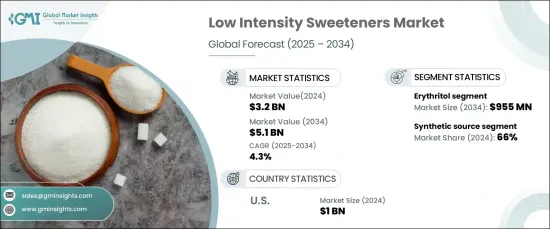
세계의 저강도 감미료 시장은 2024년에 32억 달러로 평가되었고, 2025년부터 2034년까지 연평균 성장률(CAGR) 4.3%로 성장할 것으로 전망됩니다.
이러한 꾸준한 성장은 과도한 설탕 섭취의 부작용, 특히 당뇨병 및 비만과 같은 건강 상태의 유병률 증가에 대한 소비자 인식이 높아지고 있음을 반영합니다. 식음료 업계는 진화하는 건강 트렌드와 설탕 저감화를 촉진하는 정부 지원에 힘입어 설탕을 줄이고 칼로리를 고려한 제품에 대한 견고한 수요를 목격하고 있습니다. 또한, 클린 라벨 및 식물성 감미료에 대한 선호도가 높아지면서 혁신을 주도하고 있어 시장 확대의 잠재력이 매우 높습니다.

제조업체는 맛 프로파일, 확장성 및 전반적인 제품 품질 개선에 중점을 두어 소비자 수요에 대응하고 있습니다. 생산 공정의 발전과 당뇨 친화적 제품 및 체중 관리 제품 등 식이 요건을 충족하는 새로운 감미료의 도입은 시장 성장을 더욱 촉진하고 있습니다. 그러나 이 시장은 규제 제약과 신흥 지역의 제한된 인지도 등의 도전에 직면해 있습니다. 이러한 장애물에도 불구하고 지속 가능하고 건강 지향적인 대안에 대한 선호도가 높아짐에 따라 향후 10년간 시장은 높은 성장세를 보일 것으로 전망됩니다.
| 시장 범위 | |
|---|---|
| 시작 연도 | 2024년 |
| 예측 연도 | 2025-2034년 |
| 시작 금액 | 32억 달러 |
| 예측 금액 | 51억 달러 |
| CAGR | 4.3% |
시장은 제품 유형별로 에리스리톨, 말티톨, 자일리톨, d-타가토스, 소르비톨, 만니톨, 알룰로스 등으로 세분화됩니다. 이 중 에리스리톨은 2024년에 6억 6,600만 달러를 기록했으며, 2034년에는 9억 5,500만 달러에 달할 것으로 예상되는 지배적인 부문으로 부상했습니다. 에리스리톨의 광범위한 인기는 천연 유래, 혈당 수치에 영향을 주지 않으면서 설탕의 맛을 재현하는 능력, 소화 친화적인 특성에서 비롯됩니다. 건강에 관심이 많은 소비자들 사이에서 에리스리톨의 채택이 증가함에 따라 시장의 궤도를 형성하는 데 있어 에리스리톨의 역할이 강조되고 있습니다.
공급원에 따라 시장은 천연 감미료와 합성 감미료로 분류됩니다. 합성 저감미료는 비용 효율성과 대규모 생산에서의 일관성 덕분에 2024년 시장 점유율의 66%를 차지할 것으로 예상됩니다. 가공 식품 및 음료에 광범위하게 사용되는 것은 현대인의 식단 선호도를 충족하는 칼로리를 고려한 제형에 대한 수요 증가와 일치합니다.
미국은 2024년에 10억 달러 규모의 글로벌 시장을 창출하는 주요 국가로 부상했습니다. 고칼로리 감미료와 관련된 건강 위험에 대한 인식이 높아지면서 미국 소비자들은 건강을 해치지 않으면서 단맛을 내는 대안을 적극적으로 찾고 있습니다. 이러한 변화는 특히 이 지역에서 비만과 당뇨병의 발병률이 증가하고 있다는 점을 고려할 때 더욱 중요합니다.
소비자 수요가 건강을 지향하는 혁신적인 솔루션에 지속적으로 부합함에 따라 저강도 감미료 시장은 장기적인 성장과 다각화를 위한 유리한 입지를 확보하고 있습니다.
The Global Low Intensity Sweeteners Market achieved a valuation of USD 3.2 billion in 2024 and is poised to grow at a CAGR of 4.3% from 2025 to 2034. This steady growth reflects increasing consumer awareness about the adverse effects of excessive sugar consumption, particularly the rising prevalence of health conditions like diabetes and obesity. The food and beverage industry is witnessing a robust demand for sugar-reduced and calorie-conscious products, fueled by evolving health trends and government-backed initiatives promoting sugar reduction. Additionally, the increasing preference for clean-label and plant-based sweeteners is driving innovation, offering significant potential for market expansion.

Manufacturers are responding to consumer demand by focusing on improving taste profiles, scalability, and overall product quality. Advances in production processes and the introduction of novel sweeteners that cater to dietary requirements, such as those in diabetic-friendly and weight-management products, are further propelling market growth. However, the market faces challenges, including regulatory constraints and limited awareness in emerging regions. Despite these hurdles, the growing inclination toward sustainable and health-oriented alternatives positions the market for strong growth over the next decade.
| Market Scope | |
|---|---|
| Start Year | 2024 |
| Forecast Year | 2025-2034 |
| Start Value | $3.2 Billion |
| Forecast Value | $5.1 Billion |
| CAGR | 4.3% |
The market is segmented by product type into erythritol, maltitol, xylitol, d-tagatose, sorbitol, mannitol, allulose, and others. Among these, erythritol stood out as a dominant segment, recording USD 606 million in 2024, with projections to reach USD 955 million by 2034. Erythritol's widespread appeal stems from its natural origin, ability to replicate sugar's taste without influencing blood sugar levels, and digestive-friendly properties. Its increasing adoption among health-conscious consumers underscores its role in shaping the market's trajectory.
By source, the market is categorized into natural and synthetic segments. Synthetic low-intensity sweeteners accounted for 66% of the market share in 2024, driven by their cost efficiency and consistency in large-scale production. Their extensive use in processed foods and beverages aligns with the growing demand for calorie-conscious formulations that meet modern dietary preferences.
The United States emerged as a key contributor to the global market, generating USD 1 billion in 2024. The growing awareness of the health risks linked to high-calorie sweeteners has led American consumers to actively seek alternatives that provide sweetness without compromising health. This shift is particularly relevant given the rising incidence of obesity and diabetes in the region.
As consumer demand continues to align with health-forward and innovative solutions, the low-intensity sweeteners market is well-positioned for long-term growth and diversification.